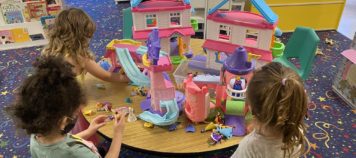Without screens children fall asleep faster & sleep sounder & longer
A recent study published in the Journal of the American Academy of Pediatrics confirms children will fall asleep faster and sleep longer if all screens are turned off at least 90 minutes before bed time. Screens trick and stimulate children’s systems and throw off their sleep-wake cycles making it more difficult to fall asleep and stay asleep. If they are used at all, we recommend never allowing screens in children’s bedrooms and turning them all off at least two hours before bedtime.
Screens before bedtime
- Keep children awake even though they are ready to fall asleep
- Stimulate the mind and delay sleeping even after the screen is turned off
- Do not relax children even if they seem to be zoned out or relaxed
- Can lead to bad dreams, nightmares & restless sleeping
Sleeping Tips for your children
All screen activity, if any, should stop two hours before bed time. Children should sleep in the same place every night and follow a routine that ends with falling asleep in their bed or crib. Your child’s room should be screen free, darkened and at a comfortable temperature.
Infants
Follow a calming routine at the same time every day
- Have a bottle (But don’t sleep with it)
- Warm Bath
- Clean diaper
- Darken room
- Swaddle or cuddle up in a soft blanket
- Pacifier (If your child uses one)
- Rock baby in arms
- Play or sing lullabies
- Read books
- Lightly rub baby’s cheeks & bridge of nose
- Gently place baby in crib on his/her back (Infants should never sleep on tummy or share a bed with an adult)
Toddlers & Preschoolers
Follow a calming routine at the same time every day about 45 minutes before your child should be sleeping
- Eat lunch or dinner
- Take a Warm Bath
- Go potty
- Darken room
- Get comfortable (take off shoes, wear pj’s… )
- Cuddle up with favorite blanket and/or stuffed toy in bedroom or bed
- Play a quite game
- Read books
- Play or sing lullabies
- Rub child’s back
- Leave room with a final ‘sleep tight’
How much sleep do children really need?
It depends. Sleeping needs vary by age and by child. Some children need more or less sleep than their piers. There are no steadfast rules. Here are some general guidelines.
Infants
- 0-2 Months Old: 12 – 18 hours per day
- 3-12 Months Old: 14 – 15 hours per day
Toddlers
- 1-3 Years Old: 12 – 14 hours per day
Preschoolers
- 3-5 Years Old: 11 – 13 hours per day
Make sure your child gets enough sleep by turning off all screens two hours before bedtime.
More about me
- Are you using the right car seat? Is your child sitting in the safest spot? - May 15, 2017
- Rear facing car seat required - November 29, 2016
- Does this sound like your three year old? - August 9, 2016






